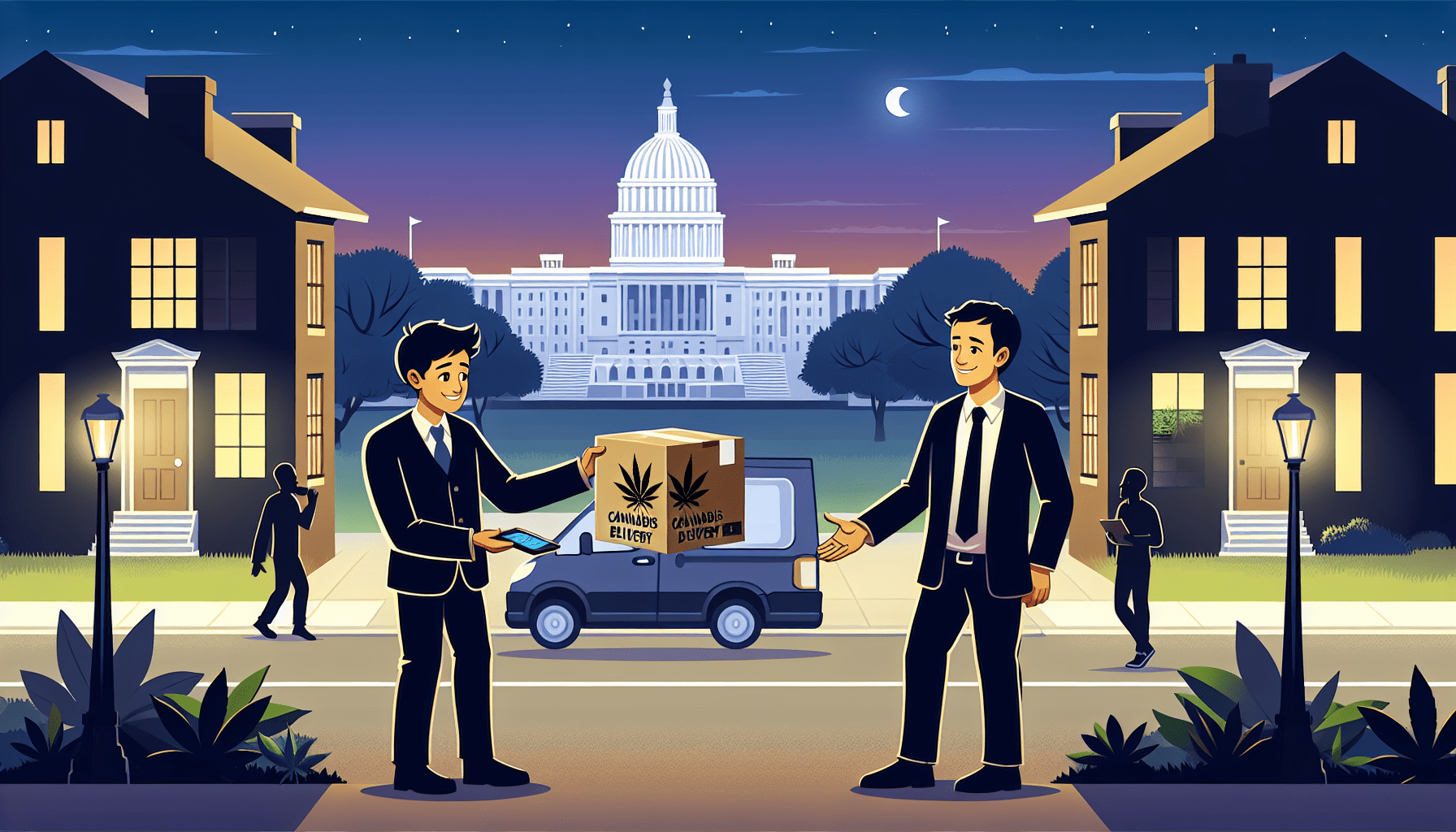Get ready to explore the fascinating world of cannabis delivery service regulations in Washington, D.C. In this article, we will take a closer look at the rules and regulations surrounding the delivery of cannabis products in the nation’s capital. From the licensing requirements to the operational restrictions, we will provide you with an overview of everything you need to know to navigate this growing industry. So, grab a cup of coffee, sit back, and let’s dive into the exciting world of cannabis delivery service regulations in Washington, D.C.

Definition of Cannabis Delivery Service
A cannabis delivery service refers to a business that is licensed to transport and deliver cannabis products directly to consumers. This service allows individuals to conveniently and discreetly purchase cannabis without having to leave their homes. By offering a delivery option, cannabis delivery services aim to cater to those who may have difficulty accessing dispensaries or prefer the convenience of having products delivered to their doorstep.
What qualifies as a cannabis delivery service
To qualify as a cannabis delivery service, businesses must meet certain criteria set forth by regulatory authorities. These criteria typically involve obtaining a proper license, adhering to operational regulations, ensuring product compliance, implementing customer registration and verification processes, fulfilling tax obligations, abiding by advertising and marketing restrictions, prioritizing employee training and safety, and complying with enforcement and penalty measures.
Types of products that can be delivered
Cannabis delivery services may offer a wide range of products, including but not limited to:
- Cannabis flowers: the dried buds of the cannabis plant that are typically smoked.
- Edibles: cannabis-infused food products such as gummies, cookies, and chocolates.
- Concentrates: highly potent forms of cannabis, such as oils, waxes, and shatter.
- Topicals: cannabis-infused balms, lotions, and creams for localized relief.
- Vape cartridges: pre-filled cartridges containing cannabis oil for vaporization.
- Beverages: cannabis-infused drinks, including sodas, teas, and coffees.
Licensing Requirements
Obtaining a cannabis delivery license
In order to operate as a cannabis delivery service, businesses must obtain a license specific to cannabis delivery. The exact process and requirements may vary depending on the jurisdiction, but generally involve submitting an application, paying fees, providing detailed business plans, and demonstrating compliance with all relevant regulations. It is crucial to thoroughly research and understand the licensing requirements of your specific jurisdiction before embarking on the application process.
Background checks and qualifications
As part of the licensing process, individuals involved in the cannabis delivery service may be subject to background checks. These checks typically look for any criminal history, particularly in relation to drug offenses. Additionally, certain qualifications may be required, such as demonstrating knowledge of cannabis products, understanding of safety protocols, and adherence to ethical and professional standards.
Financial requirements
To obtain a cannabis delivery license, businesses may be required to provide evidence of appropriate financial resources. This could include demonstrating the ability to cover start-up costs, maintain sufficient working capital, and comply with tax obligations. The specific financial requirements will depend on the jurisdiction and should be carefully reviewed and understood before applying for a license.
Insurance and liability coverage
Cannabis delivery services must also obtain insurance policies that provide adequate coverage for potential risks and liabilities. This may include general liability insurance, product liability insurance, and workers’ compensation insurance. Having proper insurance coverage helps protect the business and its employees in case of accidents, injuries, or legal issues that may arise during the delivery process.
Operational Regulations
Hours of operation
Cannabis delivery services are typically subject to specific operating hours imposed by regulatory authorities. These hours may vary depending on the jurisdiction and the type of establishment. Adhering to the designated hours of operation is crucial to ensure compliance and avoid potential penalties or license suspensions.
Delivery zones and restrictions
Regulatory authorities may impose specific delivery zones and restrictions on cannabis delivery services. These zones may be based on geographic boundaries, such as specific neighborhoods or regions within a city. Additionally, restrictions may be in place regarding delivery to certain areas such as schools, parks, or government buildings. It is important for cannabis delivery services to familiarize themselves with these zones and restrictions in order to ensure compliance.
Packaging and labeling requirements
Cannabis products that are delivered must adhere to strict packaging and labeling requirements. This includes ensuring that all products are correctly labeled with information such as product potency, ingredients, and warning labels. Additionally, packaging should be child-resistant to prevent accidental ingestion by minors. Compliance with these requirements is crucial to ensure consumer safety and prevent any misrepresentation or confusion regarding the products being delivered.
Age verification procedures
Given the age restrictions on the purchase and consumption of cannabis, cannabis delivery services must implement stringent age verification procedures. This may involve requiring customers to provide valid identification and verifying that they meet the legal age requirements. These procedures should be consistently followed to ensure compliance with regulations and prevent the delivery of cannabis to underage individuals.
Safety and security measures
Cannabis delivery services must prioritize safety and security measures to protect both their employees and the products being transported. This may involve implementing GPS tracking systems to monitor deliveries, training employees on safe driving practices and emergency protocols, and ensuring that vehicles used for delivery are properly equipped and maintained. Additionally, cannabis delivery services may need to establish safeguards to prevent theft or unauthorized access to cannabis products during the delivery process.
Product Compliance
Quality control standards
Cannabis delivery services must adhere to rigorous quality control standards to ensure that the products being delivered meet the expected quality and safety standards. This involves working closely with licensed cannabis producers and suppliers to ensure that the products are sourced from reputable sources and comply with all applicable regulations. Regular quality checks and testing may be conducted to verify the potency and purity of the products.
Testing and labeling of cannabis products
Cannabis delivery services are responsible for ensuring that the products they deliver have undergone proper testing and have accurate labeling. This includes testing for potency levels, contaminants, and ensuring that the labeling accurately reflects the contents of the product. Proper testing and labeling help consumers make informed decisions and ensure that they are aware of the potential effects and risks associated with the cannabis products they are purchasing.
Product storage and transportation guidelines
Proper storage and transportation of cannabis products are crucial to maintaining their quality and potency. Cannabis delivery services must comply with guidelines regarding storage conditions, including temperature and humidity controls. Additionally, products must be securely transported to prevent any damage or tampering. Adhering to these guidelines ensures that the products delivered to customers are of the highest quality and meet regulatory requirements.

Customer Registration and Verification
Process for customer registration
Cannabis delivery services typically require customers to register before placing an order. This registration process may involve providing personal information such as name, address, and contact details. Some jurisdictions may also require customers to provide a valid medical cannabis card or other relevant documentation. The registration process should be user-friendly and efficient, allowing customers to easily create an account and place orders.
Verification of customer’s age and identity
To comply with age restrictions, cannabis delivery services must verify the age and identity of their customers. This can be done by requesting valid identification, such as a driver’s license or passport, and confirming that the customer meets the legal age requirements. This verification process is necessary to ensure that cannabis products are not delivered to underage individuals and to maintain compliance with applicable laws and regulations.
Keeping records of customer information
Cannabis delivery services are often required to keep records of customer information in order to maintain compliance and facilitate regulatory oversight. This may include keeping track of customer orders, maintaining records of customer registration information, and tracking delivery details. Safeguarding customer information and adhering to data protection regulations is crucial to protect customers’ privacy and ensure that confidential information is handled responsibly.
Taxation and Reporting
Tax obligations for cannabis delivery services
Cannabis delivery services are subject to tax obligations that vary depending on the jurisdiction. These taxes may include sales taxes, excise taxes, and other applicable fees. It is important for businesses to understand and comply with these tax obligations to avoid penalties or legal issues. Consulting with a tax professional or expert can provide valuable guidance on tax requirements specific to cannabis delivery services.
Reporting sales and paying taxes
Cannabis delivery services must accurately report their sales and pay the required taxes in a timely manner. This involves keeping detailed records of all sales transactions, including the quantity and value of cannabis products delivered. Additionally, businesses may need to file regular tax returns and remit payments to the appropriate tax authorities. Compliance with reporting and tax payment requirements is essential to maintain good standing and avoid potential penalties or license suspensions.
Records and documentation requirements
Cannabis delivery services are typically required to maintain detailed records and documentation to demonstrate compliance with regulations. This may include keeping records of sales transactions, customer information, delivery logs, and financial records. These records should be kept for a specified period of time and made available for inspection or audit by regulatory authorities upon request. Thorough record-keeping helps ensure transparency and facilitates regulatory oversight.

Advertising and Marketing Restrictions
Prohibited advertising methods
Cannabis delivery services are subject to strict regulations regarding advertising and marketing practices. Certain advertising methods may be prohibited, such as advertising to minors, using misleading or deceptive tactics, or making claims regarding the health benefits of cannabis products without proper scientific evidence. Understanding the specific restrictions on advertising methods is crucial to ensure compliance and avoid potential fines or penalties.
Restrictions on promotion and branding
Regulatory authorities often impose restrictions on the promotion and branding of cannabis products. This may include limitations on the use of certain logos, colors, or imagery that could be appealing to minors. Additionally, restrictions may be in place regarding the use of celebrities or influencers in promotional activities. Compliance with these restrictions helps prevent the marketing of cannabis products in a manner that may contribute to increased consumption, particularly among vulnerable populations.
Rules for online and social media presence
Given the increasing prevalence of online and social media platforms, cannabis delivery services must also adhere to rules regarding their online presence. This may include restrictions on the type of content that can be shared, the platforms on which advertising can be displayed, and the use of age-gating mechanisms to prevent access by underage individuals. It is crucial for businesses to carefully review and follow these rules to ensure compliance and responsible marketing practices.
Employee Training and Safety
Educational requirements for delivery personnel
Delivery personnel working for cannabis delivery services may be required to undergo specific educational requirements. This may include training on product knowledge, understanding of applicable regulations, customer service skills, and safety protocols. Properly trained and knowledgeable employees are essential to ensure the safe and responsible delivery of cannabis products, as well as providing exceptional customer service.
Safety training and protocols
Safety training is of utmost importance for employees involved in the delivery of cannabis products. Delivery personnel should receive training on safe driving practices, handling of cannabis products, and emergency response protocols. This includes educating employees on the potential risks and hazards associated with the delivery process and equipping them with the necessary skills and knowledge to mitigate these risks. Regular safety drills and ongoing training should be conducted to maintain a strong culture of safety within the cannabis delivery service.
Handling customer complaints and disputes
Customer service is a critical aspect of any business, including cannabis delivery services. Employees should be trained in handling customer complaints and disputes in a professional and empathetic manner. This involves resolving issues promptly and effectively, ensuring customer satisfaction and maintaining the reputation of the business. Implementing a clear process for addressing customer concerns helps build trust and loyalty among customers.

Enforcement and Penalties
Inspections and compliance checks
Regulatory authorities may conduct inspections and compliance checks on cannabis delivery services to ensure adherence to regulations. These inspections may include reviewing records, inspecting delivery vehicles, verifying compliance with packaging and labeling requirements, and assessing overall operational practices. Compliance with the inspection process is essential to maintain good standing and avoid potential penalties or license suspensions.
Fines and penalties for violations
Violations of cannabis delivery service regulations may result in fines and penalties. These penalties can vary depending on the severity of the violation and the jurisdiction. Common violations may include failure to adhere to packaging and labeling requirements, non-compliance with age verification procedures, or operating outside of designated hours. It is important for cannabis delivery services to understand the potential fines and penalties associated with non-compliance and take appropriate measures to avoid them.
Suspensions and revocations of licenses
Failure to comply with regulations or repeated violations may result in the suspension or revocation of a cannabis delivery service’s license. This can have serious consequences for the business, including the inability to operate and potential loss of customers. To prevent license suspensions or revocations, cannabis delivery services must prioritize compliance, maintain accurate records, and promptly address any issues or violations that may arise.
Future Developments and Potential Changes
Proposed amendments to current regulations
As the cannabis industry continues to evolve, it is likely that regulations governing cannabis delivery services will also undergo changes and amendments. Proposed amendments may include updates to licensing requirements, adjustments to operational regulations, or changes in advertising and marketing restrictions. It is important for cannabis delivery services to stay informed about potential changes and actively engage in discussions and feedback processes to shape the future of the industry.
Potential expansion of delivery services
With the growing acceptance of cannabis and the increasing demand for convenient access, there is potential for the expansion of cannabis delivery services. This may involve broader delivery zones, extended hours of operation, and expanded product offerings. As the market evolves and consumer preferences change, cannabis delivery services should anticipate and adapt to potential opportunities for growth and expansion in order to remain competitive and meet the evolving needs of their customers.
Public opinion and political considerations
Public opinion and political considerations play a significant role in shaping cannabis delivery service regulations. As opinions on cannabis continue to evolve and societal attitudes shift, it is important for regulatory authorities to consider the expectations and concerns of the public. Engaging in meaningful dialogue with stakeholders, including consumers, advocacy groups, and policymakers, can help inform regulatory decision-making and lead to more comprehensive and effective regulations that meet the needs of all parties involved.
In conclusion, cannabis delivery service regulations in Washington, D.C. encompass a wide range of requirements and considerations. From obtaining a cannabis delivery license to adhering to packaging and labeling requirements, complying with age verification procedures, and prioritizing employee training and safety, cannabis delivery services must navigate a complex regulatory landscape. By understanding and adhering to these regulations, cannabis delivery services can ensure the safe, convenient, and responsible delivery of cannabis products while maintaining compliance and meeting the needs of their customers.
